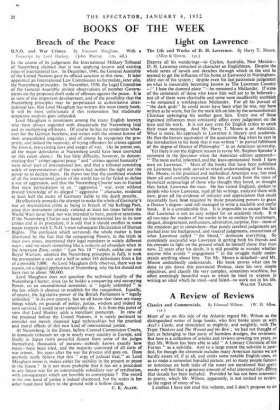DESPITE all his wanderings—to Ceylon, Australia, New Mexico— D. H.
Lawrence remained in character an Englishman. Despite the whole series of novels and sketches through which in the end he seemed to get the influence of his home at Eastwood in Nottingham- shire out of his system despite even his last passionate judgement on what is inexorably becoming known as The Lawrence Country —" I hate the damned place "—he remained a Midlander. If some of the comments of those who knew him well are to be believed— not all of them were charitable and some were insufferably snobbish he remained a working-class Midlander. For all his pursuit of "the dark gods" he could never have been what he was, nor have written as he wrote, but for the mark left on him by the nonconformist Christian upbringing his mother gave him. Every one of these ingrained influences must constantly affect every judgement on the man and his work. It is not easy even for English critics to catch their exact meaning. And Mr. Harry T. Moore is an American. What is more, his approach to Lawrence is literary and academic- He flies the literary equivalent of the quarantine flag when he says in the introduction to his book that it was written " in partial fulfilment of the degree of Doctor of Philosophy " in an American university.
Yet there is not the slightest reason to revise Mr. Stephen Spender's comment in the Spectator when the American edition appeared- " The most useful, informed, and the least-opinionated book I have seen on Lawrence." Most of the books that have been published on Lawrence have only served to retard understanding of his works. Mr. Moore, in his practical and methodical American way, has read them• all and carefully extracted the bits of truth from the mass of hysterical outpourings of those who thought they loved, or thought they hated, Lawrence the man. He has visited England, spoken to people who knew Lawrence, read all his writings, analysed them with care, given all the evidence of industry and appreciation that could reasonably have been required by those possessing powers to grant a Doctor's degree—and still managed to write a readable and useful book. It is a considerable feat. It is impossible to escape the fact that Lawrence is not an easy subject for an academic study. It is all too easy for readers of his works to be so smitten by excitement, disgust, disagreement, enthusiasm, admiration, surprise, fear—most of the emotions get in somewhere—that purely cerebral judgements are pushed into the background, and visceral judgements, emanations of what Lawrence called " the blood," dominate everything. So completely successful was Lawrence in getting both his friends and his enemies to fight on the ground which he himself chose that even now, 22 years after his death, it is still possible to wonder whether anyone who avoids " engagement " in the struggle really under- stands anything about him. Yet Mr. Moore is detached—and Mr. Moore undoubtedly understands. His book proves what can be done to pin down this provincial Proteus, state his very simple objectives, and classify the very complex, sometimes worthless, but often arrestingly beautiful ways in which he tried to express in writing an ideal which he tried—and failed—to work out in his life.
WALTER TAPLIN.






































 Previous page
Previous page